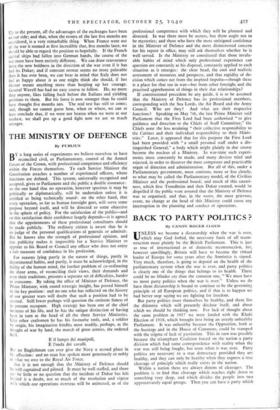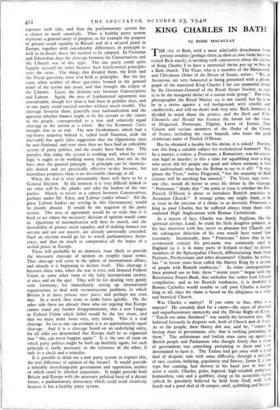BACK TO PARTY POLITICS?
By CANON ROGER LLOYD
UNLESS we become a dictatorship when the war is over, which may God forbid, the necessary basis of all recon- struction must plainly be the British Parliament. This is just as true of international as of domestic reconstruction, for, however unwillingly, Britain will have to become the virtual leader of Europe for some years after the Armistice is signed. Very much, therefore, is going to depend on the health of the parliamentary system when the war is over, and party politics is clearly one of the things that belongs to its health. There could be no blinder cry than the common one, "We must have no more party politics when the war is over." Unless we do have them dictatorship is bound to continue to be the governing principle of all European politics, and if that is to happen we had better stop saying we are fighting for freedom.
But party politics must themselves be healthy, and there lies the dilemma which will presently disclose itself, and about uhich we should be thinking now. For lack of thought about the same problem in 1917 we were landed with the Khaki Election of 1918, which brought into being an utterly unhealthy Parliament. It was unhealthy because the Opposition, both at the hustings and in the House of Commons, could be stamped with the stigma of lack of patriotism. This in turn was possible because the triumphant Coalition forced on the nation a party division which had some correspondence with reality when the war was still being fought, but none when it was over. Party politics are necessary to a true democracy provided they arc healthy, and they can only be healthy when they express a true cleavage of principle which really exists in the nation.
Within a nation there are always dozens of cleavages. The problem is to find that cleavage which reaches right down to something very deep, and which divides the people into two approximately equal groups. Then you can have a party which espouses each side, and then the parliamentary system has a chance to work creatively. Thus a- healthy party system expresses a general unity of purpose, as for example the purpose of greater social equality in Britain and of a secured peace in Europe, together with considerable differences, in principle As well as in detail, about the method to be adopted. In Victorian and Edwardian days the cleavage between the Conservatives and the Liberals was of this type. The onc party could quite happily succeed the other because their fundamental principles were the same. The things that divided them, the Irish and the Fiscal questions, were also held as principles. But the day came when neither of these questions burned in the general mind of the nation any more, and that brought the eclipse of the Liberals. Later, the division was between Conservatives and Labour. Again, the area of fundamental agreement was considerable, though less than it had been in palmier days, and so one party could succeed another without much trouble. The cleavage between them, generally over nationalisation and the question whether finance ought to be the servant or the master of the people, corresponded to a true and relatively equal cleavage in the nation as a whole. But the Economic Crisis brought that to an end. The new Govtmment, which had a top-heavy majority behind it, called itself National, with the inevitable but quite false suggestion that the Opposition must be anti-National, and ever since then we have had an unhealthy system of party politics, and the results have been dire. The paradox that today the system is working well, when by strict logic it ought to be working worse than ever, does not in the least alter the general principle. A principle can be theoretic- ally denied and yet practically effective to-day because, for immediate purposes, there is no discernible cleavage at all.
When the war is over presumably there will have to be a General Election. At the moment it is very difficult indeed to see what will be the planks and who the leaders of the two parties. Merely to revert to a contest between Conservatives, perhaps under Mr. Eden, and Labour (under whom? All the great Labour leaders are serving in this Government) would be plainly absurd. It would be the negation of the party system. The area of agreement would be so wide that it is hard to see where the necessary division of opinion would come in. Questions of nationalisation will then be unreal, and the desirability of greater social equality, and of making finance our servant and not our master, are already universally conceded. Such an election would go far to wreck parliamentary demo- cracy, and thus do much to compromise all the hopes of a settled peace in Europe.
There will probably be no domestic issue likely to provide the necessary cleavage of opinion on roughly equal terms. That cleavage will come in the sphere of international affairs, and already it is beginning to declare itself. This cleavage is between those who, when the war is over, will demand Federal Union or some other form of the fully international society, at once and on the spot. They will be for dealing very gently with Germany, for immediately setting up international organisations to deal with reconstruction problems in which Britain is at most primus inter pares, and perhaps not even that. In a word, they want to make haste quickly. On the other side there are already those who are arguing that Europe cannot stand any further disappointments, that a new League or Federal Union which failed would be the last straw, and that we must make haste very, very slowly. This is a real cleavage. So far as one can estimate it is an approximately equal cleavage. And it is a cleavage based on an underlying unity, for all alike are determined that Europe shall be so organised that "this can never happen again." It is the sort of issue on which party politics might be built up healthily again, for each principle is really necessary to the existence of the other, if only as a check and a stimulus.
Is it possible to think out a new party system to express this, the real difference of opinion of the future? It would provide a tolerably interchangeable government and opposition, neither of which could be labelled unpatriotic. It might provide both Britain and Europe with the necessary political basis of a decent future, a parliamentary democracy which could work creatively because it has a healthy party system.



























 Previous page
Previous page